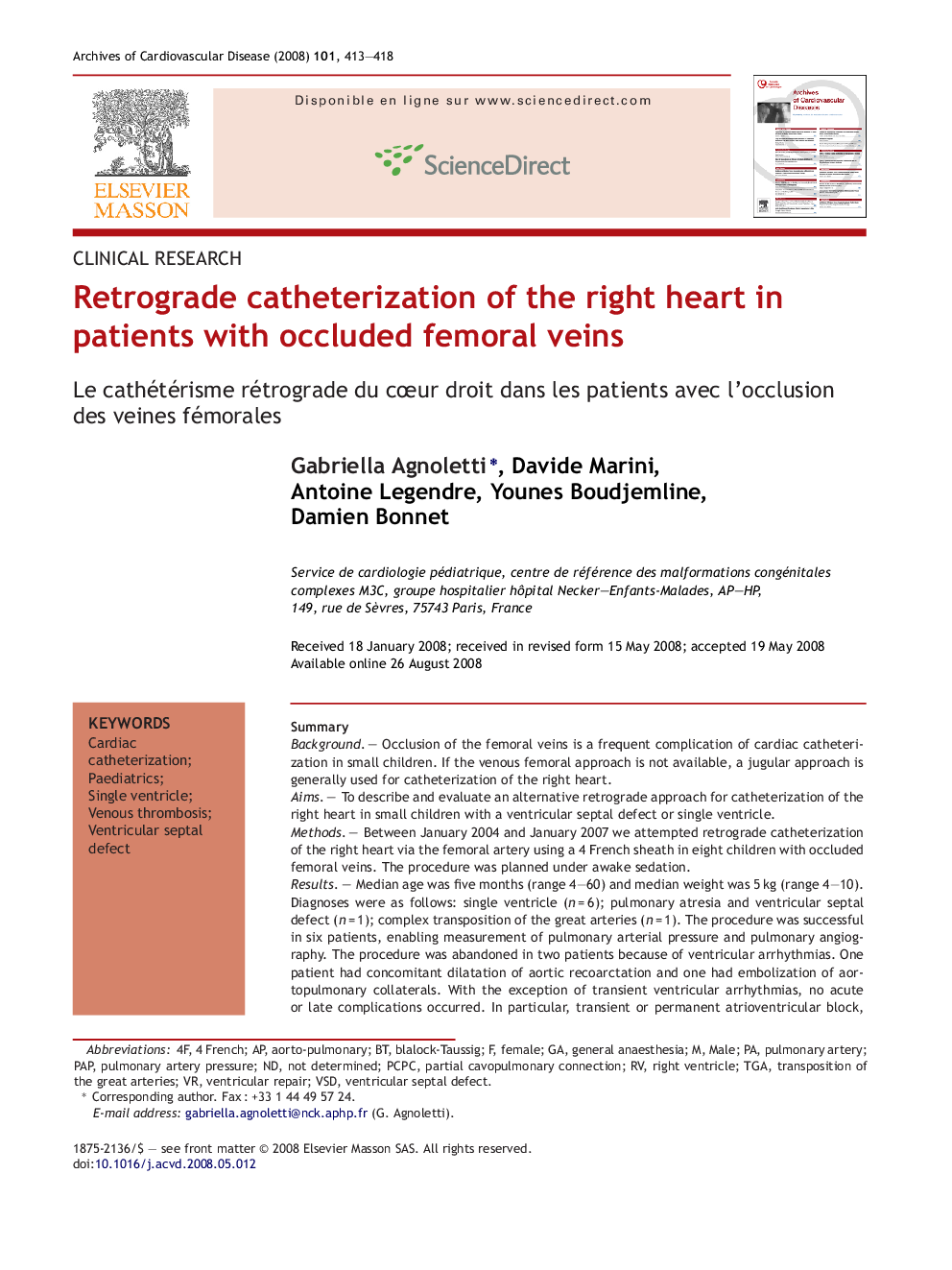| کد مقاله | کد نشریه | سال انتشار | مقاله انگلیسی | نسخه تمام متن |
|---|---|---|---|---|
| 2889658 | 1574414 | 2008 | 6 صفحه PDF | دانلود رایگان |

SummaryBackgroundOcclusion of the femoral veins is a frequent complication of cardiac catheterization in small children. If the venous femoral approach is not available, a jugular approach is generally used for catheterization of the right heart.AimsTo describe and evaluate an alternative retrograde approach for catheterization of the right heart in small children with a ventricular septal defect or single ventricle.MethodsBetween January 2004 and January 2007 we attempted retrograde catheterization of the right heart via the femoral artery using a 4 French sheath in eight children with occluded femoral veins. The procedure was planned under awake sedation.ResultsMedian age was five months (range 4–60) and median weight was 5 kg (range 4–10). Diagnoses were as follows: single ventricle (n = 6); pulmonary atresia and ventricular septal defect (n = 1); complex transposition of the great arteries (n = 1). The procedure was successful in six patients, enabling measurement of pulmonary arterial pressure and pulmonary angiography. The procedure was abandoned in two patients because of ventricular arrhythmias. One patient had concomitant dilatation of aortic recoarctation and one had embolization of aortopulmonary collaterals. With the exception of transient ventricular arrhythmias, no acute or late complications occurred. In particular, transient or permanent atrioventricular block, occurrence of new aortic insufficiency, and acute or late thrombosis of the femoral artery were not observed.ConclusionRetrograde catheterization of the right heart in small children is feasible and relatively safe. This technique can be performed without general anaesthesia and avoids a jugular approach.
RésuméIntroductionL’occlusion des veines fémorales est une complication fréquente du cathétérisme cardiaque pédiatrique. L’abord jugulaire est généralement utilisé quand les veines fémorales sont occluses. Nous décrivons une possible technique alternative qui consiste dans le cathétérisme rétrograde du cœur droit à travers l’artère fémorale chez les petits enfants ayant une communication interventriculaire ou un ventricule unique.Matériels et méthodesPendant la période janvier 2004–janvier 2007, huit enfants avec occlusion bilatérale des veines fémorales ont eu une tentative de cathétérisme rétrograde du cœur droit à l’aide d’un sonde 4F. L’âge et le poids médian étaient de cinq mois (intervalle 4–60) et de 5 kg (intervalle 4–10). Les diagnostiques étaient : ventricule unique (n = 6) ; atrésie pulmonaire à septum ouvert (n = 1) ; et transposition complexe des gros vaisseaux (n = 1). L’examen, fait sous sédation, a été complété chez six enfants et a permis de mesurer la pression pulmonaire et de faire une angiographie pulmonaire. Chez deux enfants l’examen a été abandonné à cause d’arythmies ventriculaires. Deux enfants ont eu un geste interventionnel associé (une redilatation d’une recoarctation de l’aorte et une embolisation de collatérales aortopulmonaires). Hormis les arythmies ventriculaires transitoires nous n’avons pas observé de complications immédiates ou tardives, telles que le bloc atrioventriculaire, l’insuffisance aortique et la thrombose de l’artère fémorale canulée.ConclusionsLe cathétérisme rétrograde du cœur droit est faisable chez les petits enfants ayant une thrombose bilatérale des veines fémorales avec un faible risque. Cette technique peut être faite sous sédation et permet d’éviter l’abord jugulaire.
Journal: Archives of Cardiovascular Diseases - Volume 101, Issue 6, June 2008, Pages 413–418